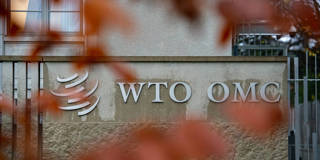Efforts to reduce global greenhouse-gas emissions must overcome the free-rider problem, and carbon border adjustment measures are the most effective way to level the playing field. But only a revived World Trade Organization could ensure that such a mechanism is applied fairly.
CAMBRIDGE – Perhaps the most important task confronting the international order is enforcement of national limits on greenhouse-gas emissions, such as those that were negotiated in the 2015 Paris agreement. Carbon border adjustments could give these limits teeth, but fair application requires a revived World Trade Organization.
Past attempts at curtailing carbon dioxide emissions have yielded limited results. China and other emerging and developing economies resist curbing their rapidly rising emissions, understandably arguing that the industrialized countries should go first because they created the problem. To be sure, the European Union has had some success, raising the price of CO2 on that continent to around €75 ($78) per ton through its Emissions Trading System. And the United States recently passed the Inflation Reduction Act, which heavily subsidizes electric vehicles and other green technologies, though the country still balks at a carbon tax.
Despite good intentions, these global efforts have not put much of a dent in climate change. Negotiators continue to waste time haggling over whether to set a global target of 1.5º or 2º Celsius for the magnitude of global warming. But existing national emission policies are too lax to achieve either outcome. Most countries have failed to meet even their own standards.

CAMBRIDGE – Perhaps the most important task confronting the international order is enforcement of national limits on greenhouse-gas emissions, such as those that were negotiated in the 2015 Paris agreement. Carbon border adjustments could give these limits teeth, but fair application requires a revived World Trade Organization.
Past attempts at curtailing carbon dioxide emissions have yielded limited results. China and other emerging and developing economies resist curbing their rapidly rising emissions, understandably arguing that the industrialized countries should go first because they created the problem. To be sure, the European Union has had some success, raising the price of CO2 on that continent to around €75 ($78) per ton through its Emissions Trading System. And the United States recently passed the Inflation Reduction Act, which heavily subsidizes electric vehicles and other green technologies, though the country still balks at a carbon tax.
Despite good intentions, these global efforts have not put much of a dent in climate change. Negotiators continue to waste time haggling over whether to set a global target of 1.5º or 2º Celsius for the magnitude of global warming. But existing national emission policies are too lax to achieve either outcome. Most countries have failed to meet even their own standards.